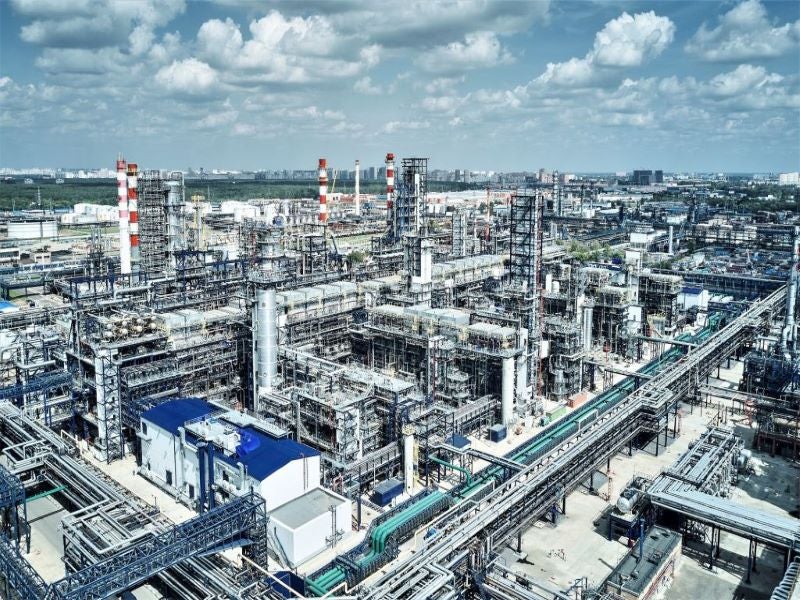The Gazprom Neft Moscow oil refinery in Russia has been undergoing a large-scale modernisation since 2011.
It is one of the oldest oil refining sites in Russia that originally started operations in 1938. Gazpromneft Moscow Refinery, a wholly-owned subsidiary of Gazprom Neft, is the owner and operator of the refinery.
The oil processing capacity of the refinery is approximately 12.76 million tonnes a year (Mtpa). It has a light-product yield of 62.32%, while the refining depth and the Nelson Index are 84.06% and 9.42 respectively.
Location and refinery output
The Gazprom Neft Moscow oil refinery is spread over approximately 286 hectares in south-eastern Moscow, Russia.
The refinery produces a range of products, including petrol, diesel, jet fuel, fuel oil, bitumen, liquefied hydrogen gas, and sulphur.
It supplies approximately 40% of the total fuel requirement of the Moscow capital region.
Processing infrastructure
The refinery houses a primary distillation unit of 15.44Mtpa capacity, a 2.64Mtpa catalytic cracking unit, a 2.16Mtpa catalytic reforming unit, and a 5.3Mtpa hydrotreating unit.
The Moscow refinery processed approximately 10.02 million tonnes of crude oil in 2020. It also started producing a winter diesel fuel, which can be used in temperatures up to -32 degree Celsius, in January 2021.
Phase one refinery modernisation
The first stage of modernisation programme carried out between 2011 and 2015 enabled the Moscow refinery to start producing the Euro-5 motor fuel in 2013.
The commissioning of a 1.2Mtpa catalytic cracking and hydrotreating unit and a 0.65Mtpa light naphtha isomerisation unit, as well as the reconstruction of the 2Mtpa diesel fuel hydrotreatment unit in 2013, enabled the refinery’s transition to producing motor fuels meeting the Euro 5 standard.
The catalytic cracking and hydrotreating unit produce fuels with low sulphur content, while the light naphtha isomerisation unit produces low-sulphur and high-octane gasoline component. A new gas fractionation unit was also commissioned at the refinery in 2015.
Phase two refinery modernisation details
As part of the second stage modernisation of the refinery, a Euro+ combined oil refining unit (CORU) of 6Mtpa capacity was commissioned in the refinery complex in July 2020.
The various modules in the Euro+ CORU include a primary crude refining unit, a gas fractionating unit, a diesel hydrotreating unit, a catalytic reforming unit, and a continuous catalyst regeneration unit. The Euro+ CORU facility enables the production of light oil products while increasing the oil refining depth.
A Biosphere biological treatment facility was also brought into operations as part of the refinery modernisation programme in late 2017. The Biosphere complex has increased the efficiency of wastewater treatment and reduced the water consumption by the refinery.
The dismantling of the five installations replaced by the new Euro+ oil refining complex was commenced in December 2020. An advanced oil refining complex, which includes a hydrocracking unit and a delayed coking unit, will also be constructed as part of the refinery modernisation programme.
Recently awarded contracts
DL E&C, an engineering and construction company based in South Korea, signed an interim agreement to construct a hydrocracking plant at the Moscow refinery in March 2021. The value of the contract is estimated to be approximately £208m ($288m).
Saipem was contracted for the engineering, procurement and construction (EPC) of a new sulphur recovery unit consisting of six trains at the Moscow refinery in the second quarter of 2019.
NIPIGAS was made the general contractor for the construction of the Euro+ combined oil refining unit (CORU) project in 2016.
AEM-technology, a part of the Atomenergomash, manufactured vacuum distillation column for the Euro+ CORU project.
Tecnimont, a subsidiary of Maire Tecnimont, in cooperation with Russian partners, was awarded an engineering, procurement and construction management (EPCM) services contract worth approximately £344.4m ($540.7m) for the execution of the Euro+ CORU project at the Moscow refinery in June 2015. The scope of the contract included the implementation of a new hydroskimming section with a set of process refining units.





